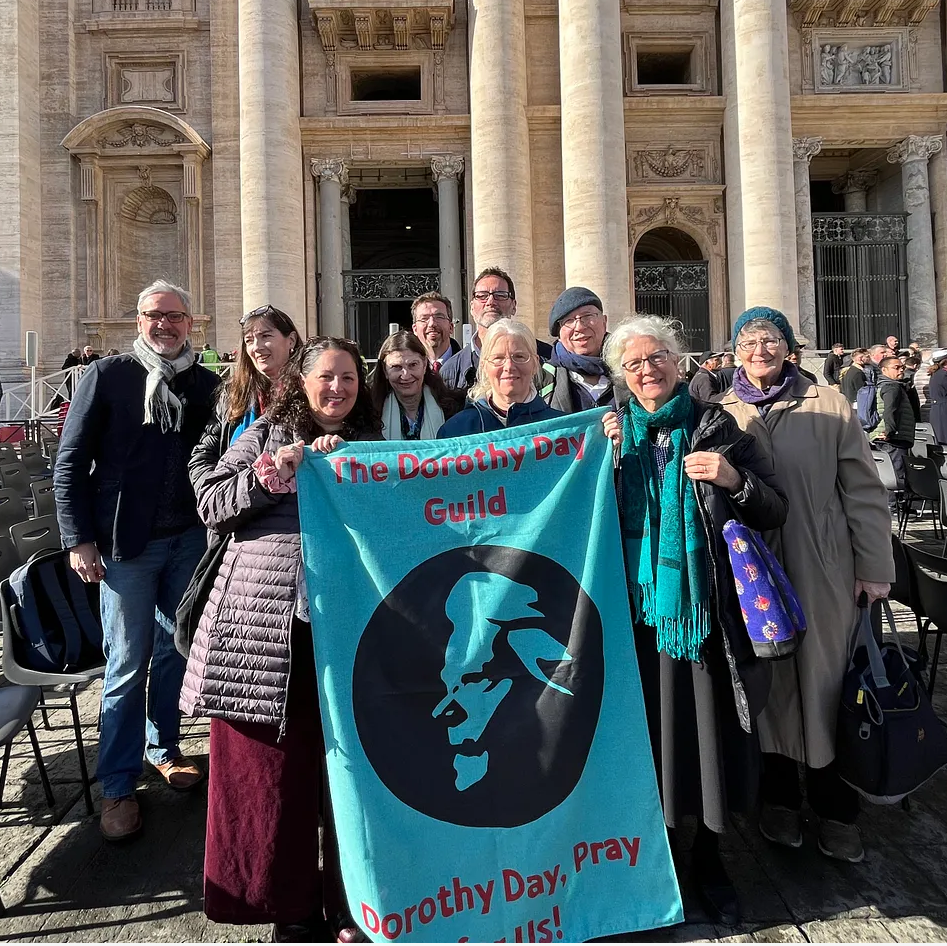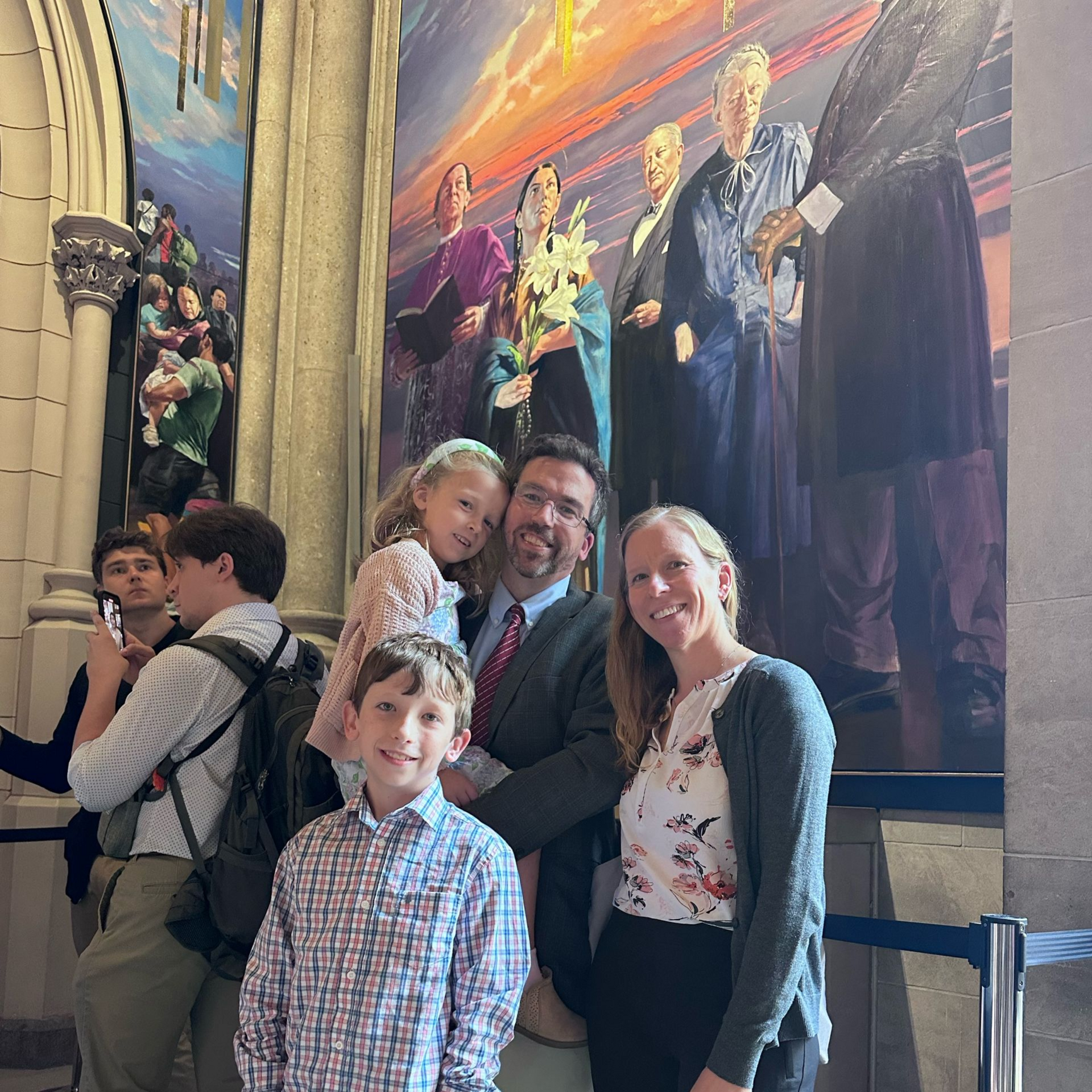"The Best Revolutionary Technique:" Dorothy on the Works of Mercy, the Mystical Body of Christ, and more
Dear members and friends of the Dorothy Day Guild,
Greetings on what for many of us in North America is already shaping up to be another hot, sticky summer day! We hope that those of you in hot climates are staying cool and are finding creative ways to support those in your towns and cities who are unsheltered from the elements. Emma, a member of our Catholic Worker community in South Bend, washes out empty milk jugs, fills them halfway with clean water, and freezes them overnight. In the morning, she fills them the rest of the way and hands them out to guests at our drop-in center to help them stay cool and hydrated throughout the afternoon. If you regularly walk or drive past homeless community members on your commute, we encourage you to pack an extra sealed bottle of water to give away on days like this.
Here in the United States, we just celebrated the Fourth of July, a holiday which admittedly doesn’t mean very much to many of those who admire Dorothy and seek to follow Christ as she did. Dorothy practiced a very different kind of revolution than the kind which is celebrated by military parades and fireworks displays. In 1940, she wrote, “we consider the spiritual and corporal Works of Mercy and the following of Christ to be the best revolutionary technique and a means of changing the social order rather than perpetuating it. Did not the thousands of monasteries, with their hospitality change the entire social pattern of their day?”
To all those who undertake the responsibility of sheltering the homeless, giving drink to the thirsty, and all works of mercy in the heat, thank you for these revolutionary acts!
Summer events:
Our Guild’s online and in-person summer programming is in full swing as of this week! As a reminder, we are running TWO book clubs this summer, one in English and one in Spanish. Our English-language club is reading
The Long Loneliness
and has already had two meetings, but it’s not too late to sign up!
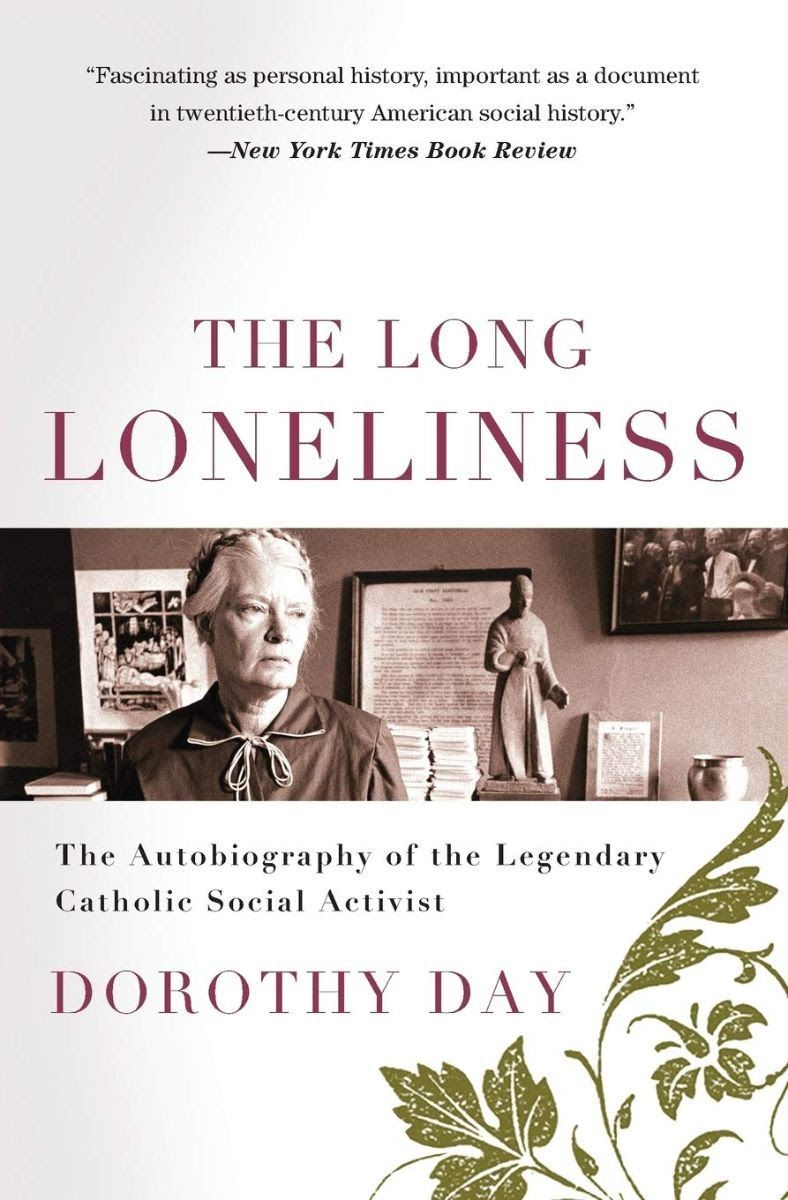
This group, which is led by Graceann Beckett, our 2024 Dorothy Day Guild Graduate Research Fellow, meets on Sunday evenings over Zoom, from 8:00-9:00 PM Eastern/ 7:00-8:00 PM Central. The group will meet four more times, on July 13th, 20th, 27th, and August 3rd, so even if you missed the opening sessions, you are warmly invited to join us for the upcoming weeks by registering here.
We are also very excited to begin our first-ever Spanish-language book club, which starts TONIGHT, July 8th, from 7:00-8:00 PM Eastern. This group is led by our 2025 Dorothy Day Graduate Research Fellow, Magdalena Muñoz Pizzulic, and will be reading Mi conversión: De Union Square a Roma (From Union Square to Rome), Dorothy’s first spiritual memoir, and the only one of her books currently available in Spanish.
Although Magdalena’s presentation and the discussion will take place in Spanish, this group is open to language-learners as well as fluent Spanish speakers.
The full text of From Union Square to Rome (in English) is available for free online, so if you’re interested in improving your language skills, we highly encourage you to sign up, follow along, and enjoy the friendly, conversational, and intellectually stimulating atmosphere that Magdalena cultivates. Our Spanish-language club de lectura will meet four times over Zoom, on Tuesday July 8th, 15th, 29th, and August 5th from 7:00-8:00 PM Eastern/6:00-7:00 PM Central. You can register by using this link.
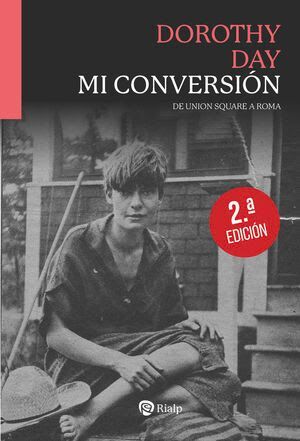
In Manhattan, we are also continuing to offer twice-monthly walking pilgrimages on Sunday afternoons. These free pilgrimages visit important sites from Dorothy’s lifetime, including the New York Catholic Worker community’s two houses of hospitality. The pilgrimages take place on Sunday afternoons, beginning at 2:00 PM, and last two and a half hours. This summer, we invite you to join us for a pilgrimage on Sunday July 13th, July 20th, August 10th, and August 24th, from 2:00-4:30 PM Eastern. Whether you are visiting New York for the first time or you’ve lived there your entire life, you’ll discover something new on these wonderful opportunities for learning and prayer. Sign up to participate in a pilgrimage here– and for a really special experience, head down to Whitehall afterwards and ride the Dorothy Day ferry to Staten Island!

Finally, we would like to remind you that the Dorothy Day Retreat at Pyramid Life Center, in Paradox, NY, is taking place this month, from July 21st-23rd. Led by Catholic Workers Martha Hennessy (of Maryhouse) and Fred Boehrer (of Emmaus House), this retreat will use Robert Ellsberg’s Dorothy Day: Spiritual Writings as a guide to explore how we are being called to live as Catholics and disciples of Christ in the United States in this moment. Several members of our St. Peter Claver Catholic Worker community had the chance to visit Fred at Emmaus House last month– he and Martha have some wonderful programming planned, and you don’t want to miss this retreat!
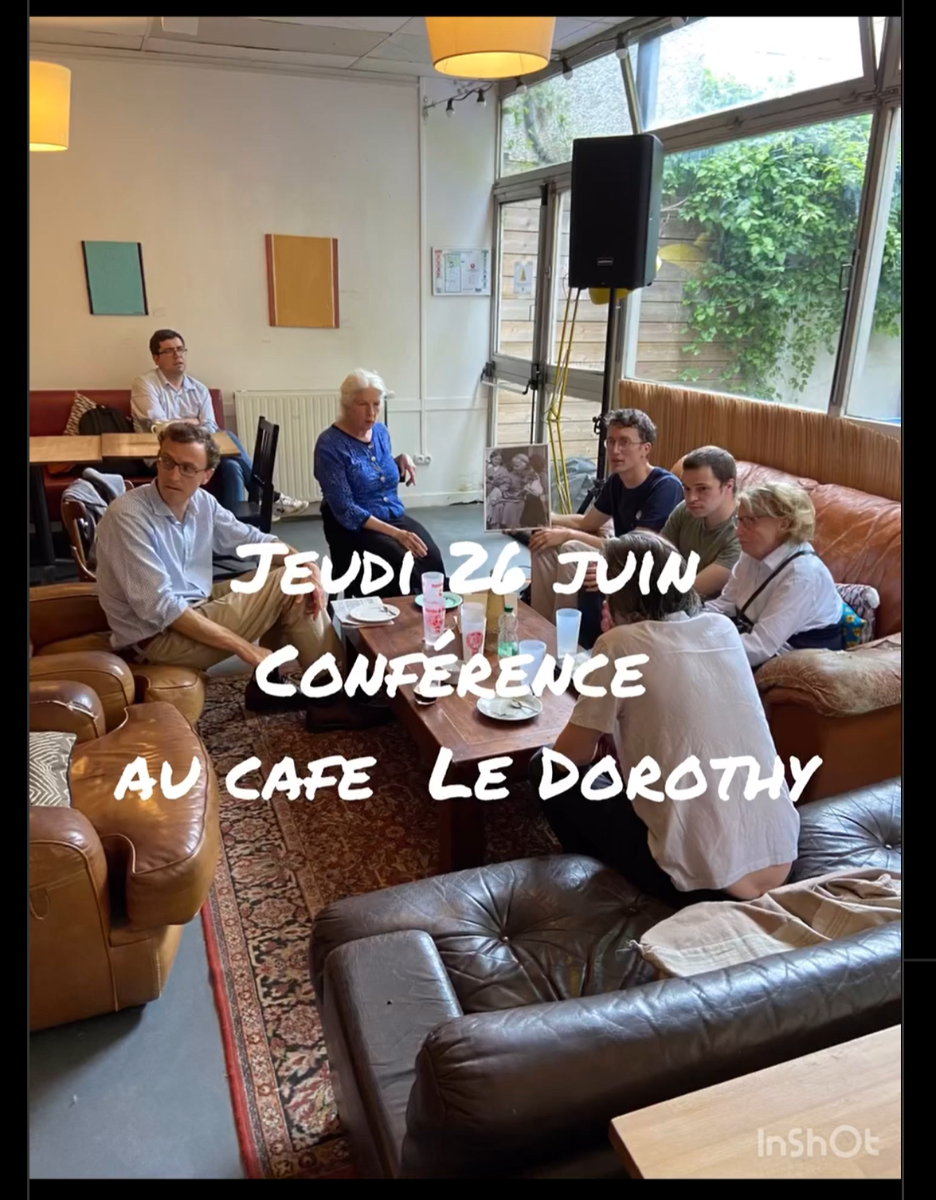
News and Updates from our friends:
Last month, Martha Hennessy traveled to France to speak at Le Dorothy Café in Paris, an event sponsored by the Le Dorothy community in conjunction with a month-long exhibition of paintings entitled “Dorothy Day: changer l’ordre social,” by artist François Rieux. Le Dorothy offers hospitality and cultural programs in their neighborhood, where many of the residents are recent immigrants.
You can view additional photos of Martha’s visit on François’ Instagram and read the interview by Baudouin de Guillebon, “Martha Hennessy : un pacifisme chrétien pour le XXIe siècle,” (“Martha Hennessy: A Christian Pacifism for the 21st Century”) about her trip, her grandmother, and her own nonviolent, Gospel-centered activism. We’re also very pleased to share an English-language version of this interview, thanks to the translation efforts of Barbara Kentish.
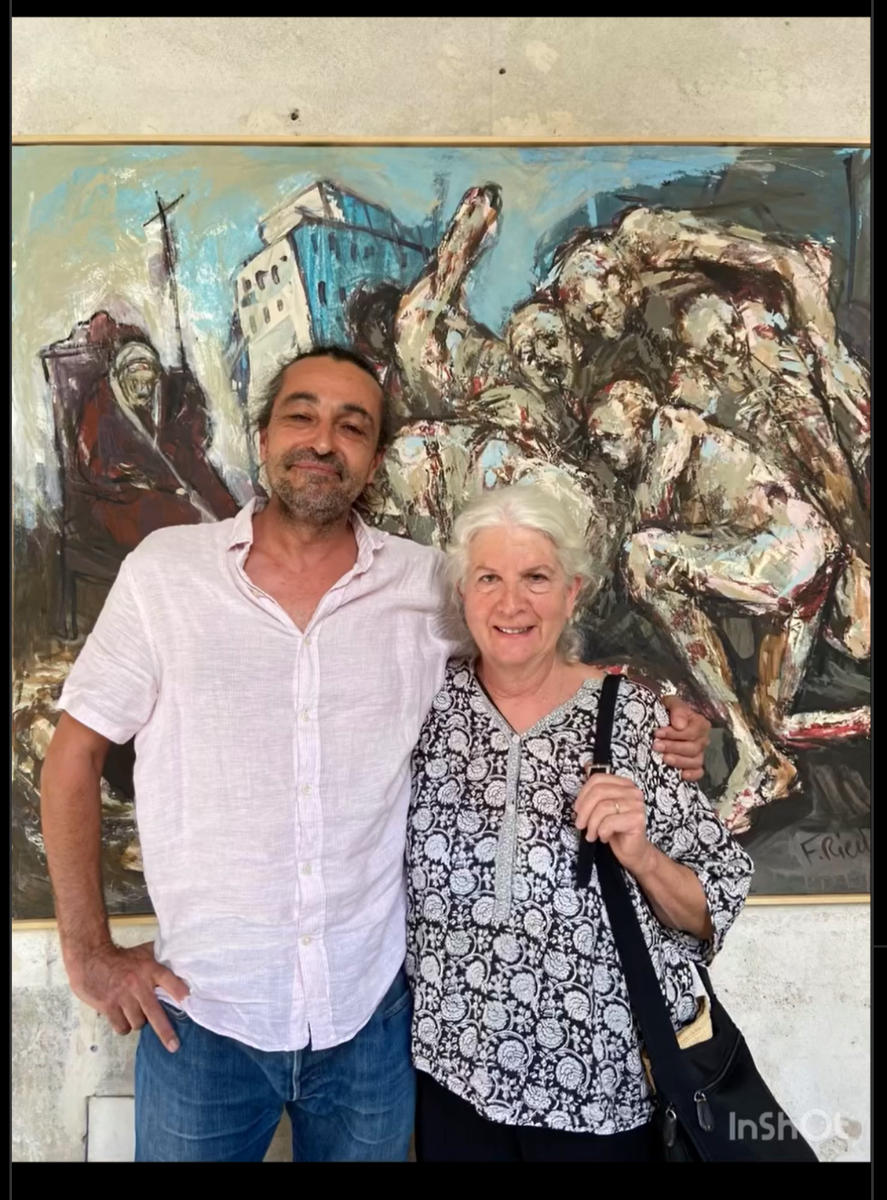
We also recently learned of an exciting and similar effort in Baton Rouge, Louisiana, the brand-new Dorothy Day Café at Sacred Heart of Jesus Parish. Our office manager, Jodee Fink, wrote to the pastor of Sacred Heart, Fr. Josh Johnson, who said,
“Inspired by Dorothy’s radical fidelity to the Gospel and her love for the poor, we opened the café across the street from our parish to create a space of welcome, encounter, and dignity for our neighbors, especially those experiencing poverty and homelessness in our Mid City community… We will offer free coffee, conversation, and a spirit of community to anyone who walks through our doors. We hope it will become not only a place for physical nourishment but a spiritual one, where many of our guests will be invited to join small group bible studies, visit our Adoration chapel, participate in our ACTS retreats and encounter Christ in the Sacraments.
We’re also grateful to have the café physically connected to our new St. Vincent de Paul Food Pantry. Together, they form a hub of hospitality and mercy, where people can receive both nourishment and care in body and soul.”
Fr. Josh wrote a longer explanation of why the community chose to name this new hospitality space for Dorothy in the Sacred Heart parish bulletin, which you can read here.

The Dorothy Day Café will open its doors for the first guests on Thursday, August 7th, so please keep this work of hospitality in your prayers (and if you’re near Baton Rouge, sign up to volunteer!)
Reading Recommendations:
We have a few short articles to share with you for a little bit of additional summer reading! One of the best things about Dorothy’s legacy in journalism, Catholic media, and the Church at large is the diversity of voices who are inspired by different aspects of her life. This month, we’re excited to share articles from Roundtable, National Catholic Register, and America.
First, a very short piece by David Mills in National Catholic Register examines “What Dorothy Day and G.K. Chesterton Teach Us About Gratitude.” Gratitude, for both these 20th-century Catholic writers and converts, was what ultimately led them to faith. The realization that they had been given great gifts in the context of their ordinary lives led them each to seek out the Giver of all good gifts and turn to Him with love and thanksgiving.
For this week’s edition of Roundtable, Renée Roden interviewed Magdalena Muñoz Pizzulic on the South American reception of Dorothy’s writing and legacy, translating Dorothy’s columns into Spanish, and Magdalena’s own experience in her first year as a Catholic Worker after graduating with a masters’ degree in moral theology. Here in the United States, we sometimes forget that the global Church may have different priorities in other parts of the world; in this interview, Magdalena states that from her perspective, the Catholic Church in the US feels very conservative in comparison with her native Chile. She anticipates that South American Catholics encountering Dorothy for the first time “will be surprised on discovering a saint, a woman that was so radical and progressive in a society where we are not used to seeing these kind of figures coming from... I think that will be very surprising and very encouraging.” She goes on to note that due to the history of the United States’ involvement in Central and South American politics in the latter half of the twentieth century,
“There is a negative perception [in South America]… of the colonial power to the north. ‘U.S. intervention affected basically all the Latin American countries and basically promoted all the dictatorships,’ Muñoz said, referring to U.S.-backed coups in Brazil, Bolivia, and Chile during the 1960s and 1970s. Muñoz said it was encouraging to read a voice like Dorothy Day’s from the United States that was contemporary with these coups and yet ‘was supporting revolution, was supporting the people, was against these dictatorships that were sponsored by the U.S.’
‘Especially now that the whole world situation is very fragile, I think that her voice and her message and commitment to peace is extremely relevant,’”
Check out the entire interview, “A Voice for the Revolution: Translating Dorothy Day,” and consider subscribing to Roundtable for more great stories on how the nonviolence, hospitality, and voluntary poverty that Dorothy practiced is shaping the Catholic Worker movement in the present day.
Finally, Kevin Ahern published a recent article for America, “On hearing Trump invoke God after bombing Iran on the feast of Corpus Christi.” In this piece, Kevin looks to Dorothy’s understanding of the Mystical Body of Christ and her Eucharistic Christology to ask,
“what, if anything, the feast of Corpus Christi, the Solemnity of the Most Holy Body and Blood of Christ, might have to say to us as the United States entered another unjust, and possibly illegal, war in the region.
This celebration offers a counterpoint to the god of war, power and vengeance invoked by so many today. In celebrating the feast day with processions and solemn veneration, however, this deeper expansive reality can often get lost; we might forget the radical social implications of proclaiming the real presence of the Eucharist.”
Dorothy knew that the sacramental unity we participate in through our baptism and through partaking in the Eucharist obligates us to one another. Dorothy took this line of thinking to an even more radical conclusion: because Christ took on human flesh, becoming one of us, those obligations extend beyond the boundaries of the Church to all of humanity– members and potential members of the Mystical Body alike. As we continue to reflect on the nature of the Church, the Body of Christ on earth, during this season of Ordinary Time, we encourage you to reflect on what Kevin has offered us here, and as always, continue to pray for an end to all war and for a just and lasting peace in the Holy Land and elsewhere.
Watching and Listening:
Last month, we shared Lisa Marr and her band, Los Gatitos, brand-new single, “The Ballad of Dorothy Day.” Phil Runkel, former archivist for the Dorothy Day/Catholic Worker collection at Marquette University, wrote to us remembering an earlier song by the same title, written and performed by folk musician and medical doctor, Hugh Blumenfeld. If anyone knows where to find a recording of Hugh’s ballad, please let us know!
In her own lifetime, Dorothy was much more of an opera and classical music devotee than an active participant in the nearby Greenwich Village folk scene of the 1960s, but given her social justice commitments and connections to the labor movement, it’s no surprise that her life and witness have been an inspiration to a number of folk and indie musicians over the years.
At the Old Songs Festival in Altamont, NY last month, some friends and I had the chance to hear Sally Rogers perform a song based on Dorothy’s own words, from her album “Old Friends I’ve Never Met.” Sally’s “No Time to Feel Hopeless” is based on a quote from Dorothy: “There’s no time to feel hopeless when there is so much work to do.”
We were so excited to hear Dorothy’s words on the main stage of the festival, and Sally was kind enough to meet with us afterwards (we gave her a Dorothy Day Guild sticker for her guitar case!).
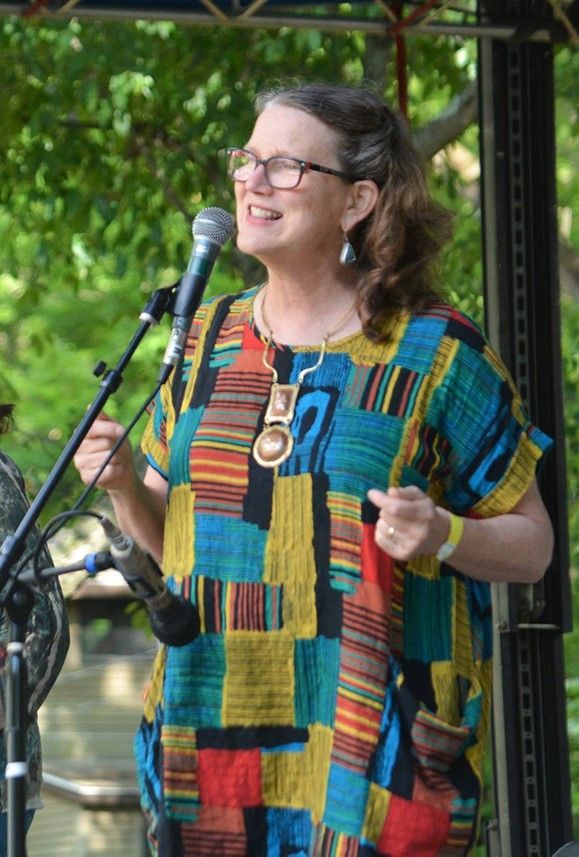
Be sure to check out her album and keep an eye out for her upcoming shows! It’s such a joy to see how Dorothy’s legacy of nonviolence, hospitality, and voluntary poverty is continuing to spark creativity in music as well as the visual arts.
We’re also very happy to share that the recording of our Easter-season online roundtable, “Dorothy Day and Pope Francis,” is now available on our YouTube channel. In this conversation, panelist Robert Ellsberg describes Francis as Dorothy's "dream pope." Dorothy and Pope Francis both left our Church, and our world, with a shared legacy of peacemaking, voluntary poverty, love for creation, and care for the poor. In short, they left us with the gift of hope.
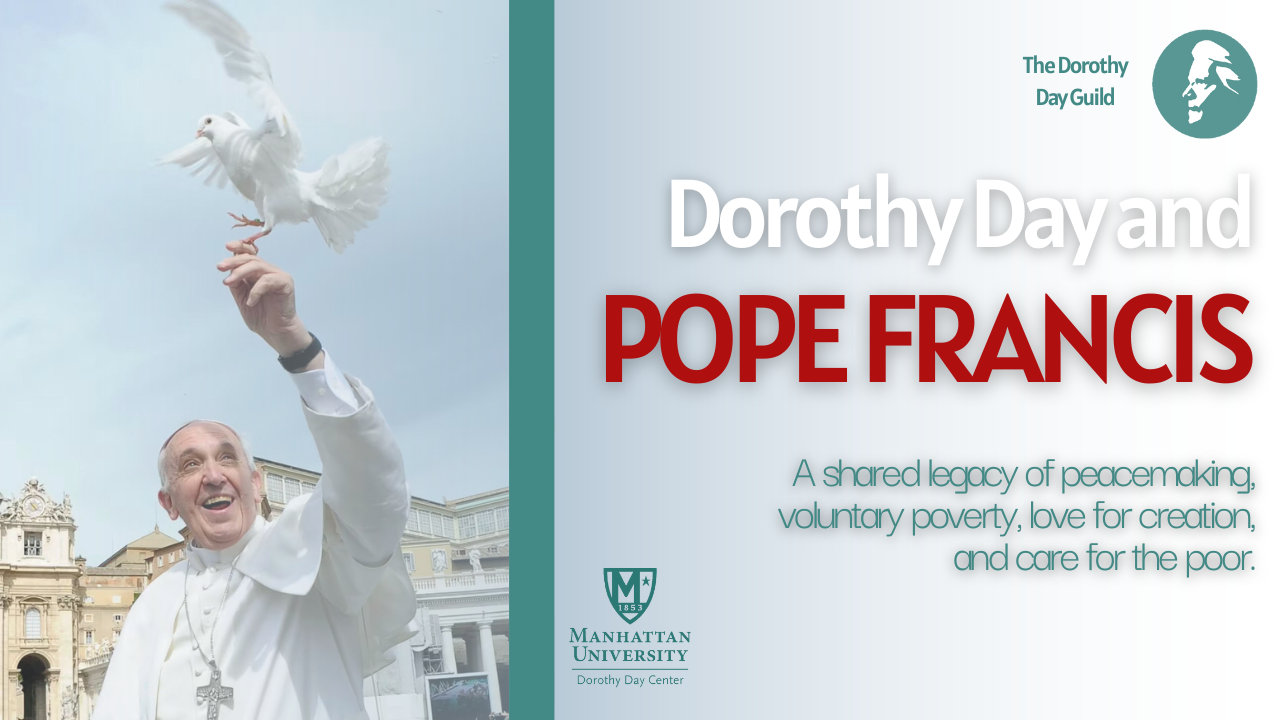
This webinar, which featured panelists Robert Ellsberg, Dr. Margaret Pfeil, Deirdre Cornell, and Magdalena Muñoz Pizzulic, and moderator Dr. Kevin Ahern, took place just days after we welcomed Pope Leo XIV as the new shepherd for our Church. Our panelists’ discussion touches on not just points of convergence between Dorothy and Francis, but on what Pope Leo’s election could mean for our global Church and for the future of Dorothy’s canonization cause. What might the election of the first Pope from the United States mean for this future (we hope!) American saint? Others, including Michelle La Rosa over at The Pillar, are asking the same question, and we’re excited to find out!
Honors and Awards:
On June 27th, the Catholic Media Association announced their 2025 Book Award winners, and we are very pleased and proud to share that two of our friends received honors for books about Dorothy! Colin Miller’s, We are Only Saved Together: Living the Revolutionary Vision of Dorothy Day won First Place in the Catholic Social Teaching category, and Robert Ellsberg’s Dorothy Day: Spiritual Writings took Second Place in the Spirituality category. Robert was also awarded Author of the Year, on the basis of having published five prize-winning books in the past five years—three of them editions of Dorothy's writings. Congratulations to Robert and Colin!
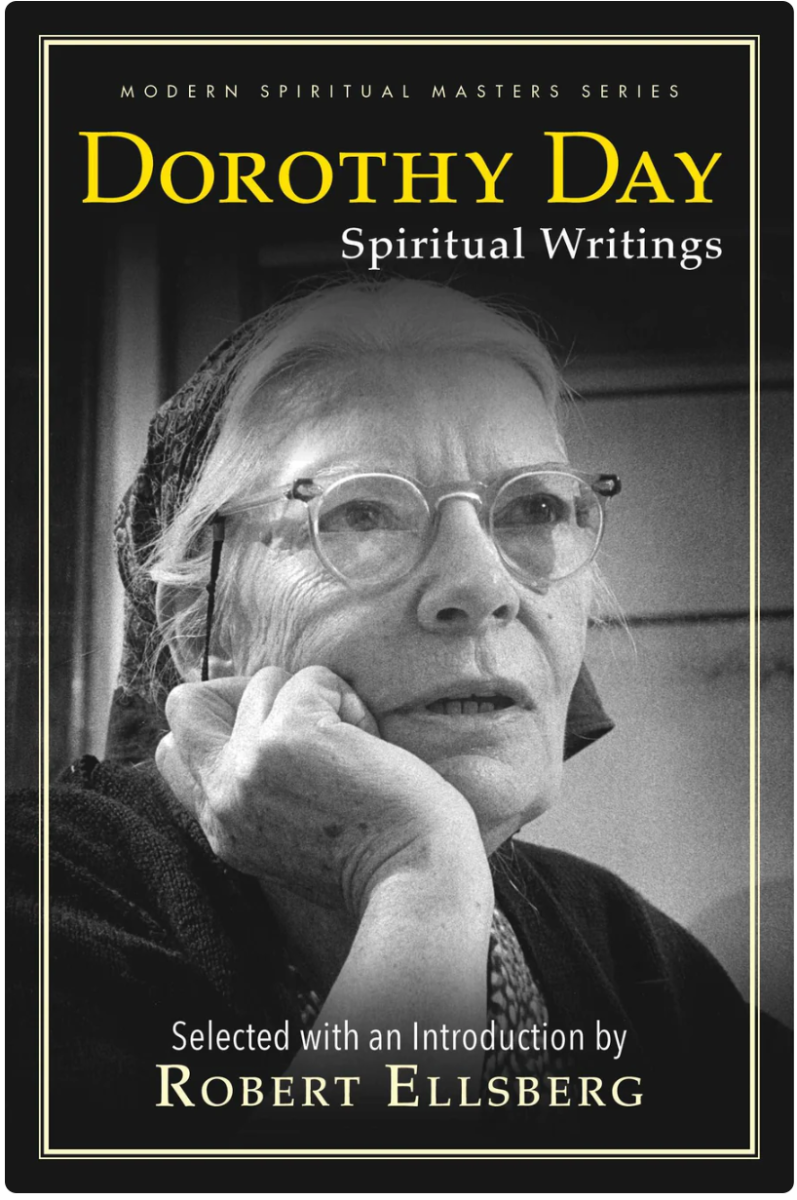
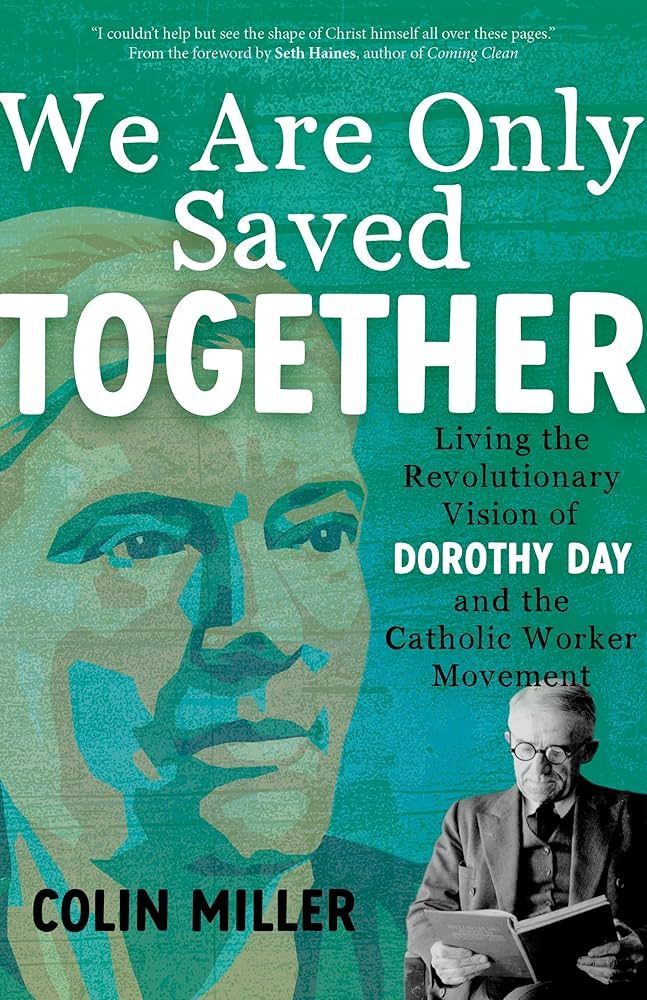
Pax Christi Metro New York also honored Brian Terrell, alongside several others, including our friend Tom Dobbins of Catholic Charities NY and the Sisters of St. Joseph who lead the Long Island Immigration Clinic, at their annual Peacemaker Awards Celebration last month. Brian was honored at this event for his life-long work for nuclear disarmament.
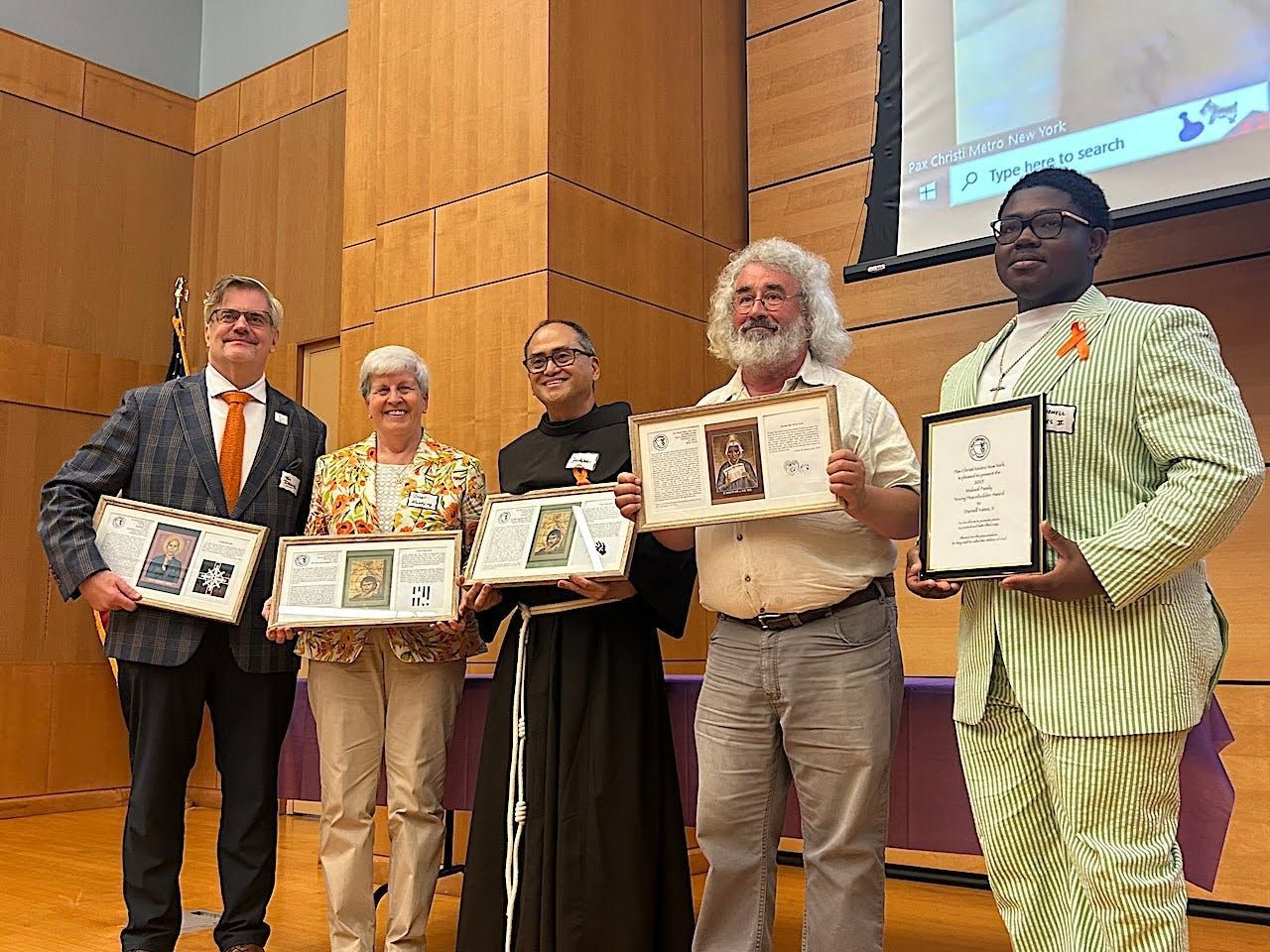
In his acceptance speech, Brian reflected on his early formation in the New York Catholic Worker community, where he lived and worked alongside Dorothy.
“I’m convinced that if the world survives these dangerous times it will be because of tens of millions of small things. [Pete Seeger] said ‘Perhaps the best, most effective contribution we can make to save the planet will be for each of us to accomplish one or two of the tens of millions of small things that need to be done.’ ‘The only solution is love,’ said Dorothy Day, echoing Jesus and the prophets. She also called nonviolent resistance the only sane solution, and I’m growing to think that those are two ways of saying the same thing. With the world the way it is, we cannot dismiss loving our neighbor, even loving our enemies as ourselves, as what Catholics call the council of perfection or as a utopian, impractical, unreachable, maybe even dangerously sentimental ideal. Love today is the only pragmatic option.”
Please join us in congratulating Brian and all the heroic peacemakers who have contributed their small acts of courage, faith, and kindness to the work of ridding our world of the scourge of nuclear weapons and ending our unceasing preparation for war.
Prayer Requests:
Prayer, both for Dorothy’s canonization, and for the needs of the world through Dorothy’s intercession, is a significant work of the Dorothy Day Guild and a shared responsibility for all of our members. If you or a loved one has a specific intention you would like us to share with our membership, or if you would like to share a concern in the wider community so that we can all pray together, please let us know.
The Guild receives and shares prayer requests every month, some personal and specific, and some more general. We trust that God sees and holds all of our needs, large or small. This month, we ask that you offer a special intention for the safety of all immigrants and refugees in the United States who may be at risk of deportation. During the Lenten season, the USCCB’s The Department of Migration and Refugee Services, collaborated with evangelical Christian leaders and colleagues to research and publish a report entitled “One Part of the Body: The Potential Impact of Deportations on American Christian Families.” This report, which is signed by Bishop Mark J. Seitz of El Paso, who serves as the chair of the Chairman, USCCB’s’ Committee on Migration, states,
“Our prayer with this report is that American Christians will recognize that these proposed deportations… are not just a policy issue, but a dynamic that will impact us, disciples of Jesus who are knit together in unity under Christ. Love for one another, Jesus said, is a sign to those outside of the Church that we indeed are Christ’s disciples (John 13:35), but such love must go beyond vague expressions of sympathy that do not actively care for the tangible needs of our brothers and sisters (James 2:14-16). As you read this report, we hope that you will prayerfully ask the Lord what part you should play at a time when so many of your brothers and sisters are fearful of the impacts of deportation.”
Please ask Dorothy to join you, our Catholic bishops, and our brothers and sisters from other Christian denominations in prayer as we intercede for these vulnerable members of all of our communities and those who assist them.
We would also like to ask your prayers for the repose of the soul of Marguerite Cackley, of Voorheesville, NY, who died last month at the age of 101. In her obituary, her family named Dorothy as a figure for whom Marguerite held life-long admiration. I had the privilege of meeting Marguerite several times as a teenager and remember her as lively and kind, eager to share her French language and culture and interested in the doings of young people in her community. Marguerite leaves behind a large and loving family; please ask Dorothy to pray for their consolation as they grieve their beloved mother and grandmother.
Finally, please join us in praying for Deborah Sucich (pictured below), a member of the Dorothy Day Guild and former Staten Island Catholic Worker, who recently entered the Poor Clares in Wappingers Falls, NY. When I called the monastery to offer our congratulations and prayers on behalf of the Guild, Sister Regina assured me that the nuns would also be praying for Dorothy’s canonization, and for the Catholic Worker movement.
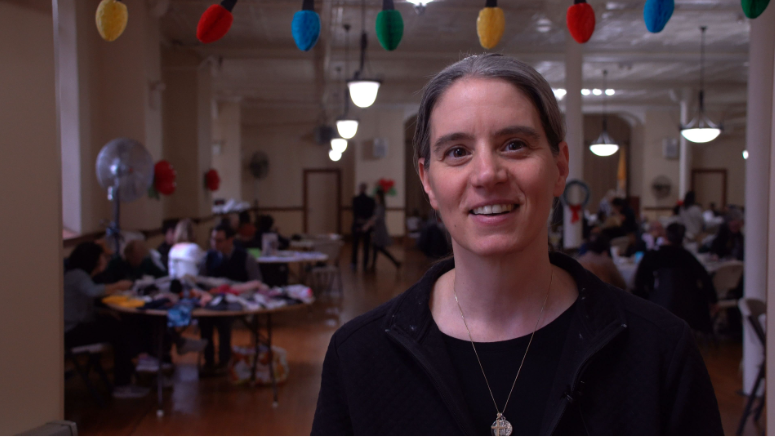
It is an incredible gift to be united through prayer to our brothers and sisters as members of the Mystical Body of Christ, and we are so grateful to the Poor Clares for their centuries of fidelity to this spiritual work of mercy.
As Debbie embarks upon this new journey as a bride of Christ, the Staten Island Catholic Worker is now shepherded by Anne-Louise DePalo, who has offered some reflections on the community’s website. We were particularly struck by the contemplative spirit she encountered at Maryhouse, in the midst of the hustle and bustle of daily hospitality:
“I was blessed to be able to visit and spend time alone in the very room that Dorothy Day lived and died at Mary House. As I entered the room, the first thing I noticed was all the books surrounding the bed, table, and sitting room. Books were everywhere, neatly placed on bookshelves.The books surrounded Dorothy wherever she was in the room.
The room had a charming simplicity. I felt peaceful, yet alive and inspired. Dorothy’s hairbrush, personal items, her glasses, and coffee mug were placed just as if she would return the next morning. A cup of coffee and a Psalms was a daily ritual, which Dorothy practiced and loved; it grounded her. Dorothy also attended daily Mass. The Eucharist was her nourishment and food for the soul. I felt as if Dorothy would walk in at any moment, telling me to go downstairs to help make the soup and serve, as the line formed outside Mary House. Dorothy’s Spirit fills Mary House.
In every Catholic Worker community where there is soup served with love Dorothy is there and her legacy lives on.”
This month, please join us in holding all of these intentions in prayer, asking Dorothy’s loving intercession for those in need, and all who are carrying out the works of mercy and the works of peace in our world today.
A few words from Dorothy:
Journalist and political commentator Bill Moyers died last month in New York at the age of 91, prompting many tributes and retrospectives on his long career. For us, the highlight of that long lifetime of research, interviews, and writing was his 1973 episode of the
Bill Moyers Journal, “Dorothy Day: Still a Rebel,” where he interviewed Dorothy and several other members of the New York Catholic Worker community at St. Joseph House and the farm in Tivoli, NY.
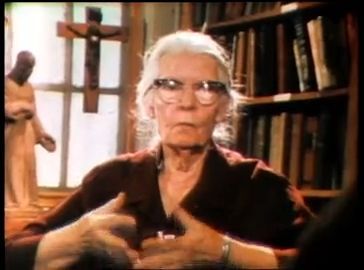
In this interview, Moyers asks Dorothy about her claim that if the chancery ordered her to stop publishing The Catholic Worker, she would cease immediately. Moyers asked her how she squares this claim with her convictions on human freedom and the necessity of fidelity to conscience. Dorothy responds,
“When I say I would obey Cardinal Spellman or...there's many times a great weariness in work of this kind and you think to yourself how pleasant it would be if I could just drop all responsibilities and all authority, the authority which comes you know, from the fact you've taken it upon yourself to do something...and you have to do it. And somebody saying 'stop' and my conscience, I think, in looking around me and seeing the tremendous growth of the Catholic Worker around the country in all these small ways, these very small ways, made me realize that I could immediately obey the Cardinal and nothing could stop the Catholic Worker. I must say that I first became a Catholic because I felt that the Catholic Church was the church of the poor and I still think it is the church of the poor….
But the Church itself misunderstood, as I say, in many many ways. There's the freedom in the Church which is something that nobody understands. I believe in miracles, of course; I believe that perhaps someday there may be mutinies large enough to bring an end to war. Who knows what will happen?”
If you haven’t yet had the chance to see this wonderful short documentary, we encourage you to watch the whole half-hour segment, which begins at minute mark 1:38 in the video. There is something incredibly powerful about truly hearing Dorothy in her own words, and perhaps even more so, to see the houses of hospitality where she lived and worked and know that the community there is still serving soup and coffee this very morning. Miracles continue in both great and small things; our prayer for each of you and for the Church this month is that we awaken to this reality and become joyful participants in God’s ongoing action in our world.
In peace,
Dr. Casey Mullaney, on behalf of the Dorothy Day Guild
Share this post
